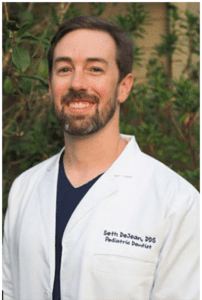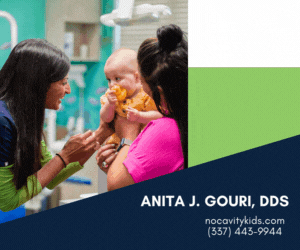Disclosure:: This post is sponsored by Lafayette Pediatric Dentistry and authored by Dr. Seth Dejean.
Talk Less, Listen More: The Future of Pediatric Dentistry
Yes, you read the title right and no, this isn’t a review of Lin-Manuel Miranda’s Hamilton. Like other dental and medical specialties, pediatric dentistry is experiencing many exciting changes. Perhaps the most important is how clinicians interact with their patients and families and the manner in which they plan appropriate treatment. Like the proverb says, “It takes a village to raise a child”, the same is true for keeping a healthy, beautiful smile from the time the first tooth erupts and eventually into late adulthood. The “dental village” consists of the pediatric dentist and a well-trained staff, the patient, and the patient’s parents and/or caregivers. What’s changing is who plays the lead role in this relationship or “village”. In the past, the pediatric dentist was the leader and management of the patient was more of a reactive relationship rather than a proactive process. An example of a reactive relationship is when the patient comes to the office twice a year for a checkup and any teeth that have a cavity are subsequently treated. Nowadays, many pediatric dentists are learning to take on the role of an active listener so that they can gauge their patient’s own willingness to make healthy changes. This also allows them to assess and affirm their patient’s oral hygiene strengths through reflective listening. In order to be a proactive dentist, the primary focus must be on prevention. This involves a detailed discussion of risk and protective factors from a biologic and environmental standpoint. Two techniques, motivational interviewing and shared decision making, allow pediatric dentists to engage with their patients on a deeper level and when needed, provide more individualized and comprehensive treatment.
consists of the pediatric dentist and a well-trained staff, the patient, and the patient’s parents and/or caregivers. What’s changing is who plays the lead role in this relationship or “village”. In the past, the pediatric dentist was the leader and management of the patient was more of a reactive relationship rather than a proactive process. An example of a reactive relationship is when the patient comes to the office twice a year for a checkup and any teeth that have a cavity are subsequently treated. Nowadays, many pediatric dentists are learning to take on the role of an active listener so that they can gauge their patient’s own willingness to make healthy changes. This also allows them to assess and affirm their patient’s oral hygiene strengths through reflective listening. In order to be a proactive dentist, the primary focus must be on prevention. This involves a detailed discussion of risk and protective factors from a biologic and environmental standpoint. Two techniques, motivational interviewing and shared decision making, allow pediatric dentists to engage with their patients on a deeper level and when needed, provide more individualized and comprehensive treatment.
Motivational interviewing in pediatric dentistry is a discussion between the pediatric dentist and the family that inspires the patient to make healthy changes based on their own values, strengths, and resources.
It allows the family to choose realistic and attainable goals that improve the patient’s oral health. Research shows that this technique is very effective in the prevention of cavities and when needed, providing treatment options that best suits the patient and their family. Personally, I have seen great improvements in patient’s oral hygiene and attitude towards prevention when given proper guidance and autonomy. It is important to remember that change is a process.
Another effective practice that is well supported by research is shared decision making.
This primarily comes into play when dental treatment or a modification to oral hygiene or dietary habits are needed. In the past, there were two main models that were used in the planning of dental treatment. Those were a paternalistic decision making model and an informed decision making model. The paternalistic decision making model relies heavily on  the expertise, training, knowledge, and authority of the pediatric dentist. Typically, there is little to no input from the patient or their family. With the informed decision-making model, multiple treatment options are presented to the patient and their family and the final treatment plan is decided by the patient and family based on their preferences, financial situation and personal values regarding dental care. While this model gives the patient’s family more latitude to choose a treatment option, there is more room for limited or subjective information passed on to the patient and family from the clinician. With shared decision making, the pediatric dentist listens with compassion and provides the family with more than one treatment option that is particular to their needs. The final treatment is thoroughly discussed and agreed upon by the clinician and the family. This allows the pediatric dentist to provide dental care that is specific to the patient by taking into account the patient’s behavior and willingness to make healthy changes. The pediatric dentist should do this by asking open-ended questions, affirming that behavioral changes can be difficult but at the same time acknowledging the family and patient’s strengths to make these changes. By working with a pediatric dentist who uses these techniques, your child will have a healthy, beautiful smile that lasts a lifetime.
the expertise, training, knowledge, and authority of the pediatric dentist. Typically, there is little to no input from the patient or their family. With the informed decision-making model, multiple treatment options are presented to the patient and their family and the final treatment plan is decided by the patient and family based on their preferences, financial situation and personal values regarding dental care. While this model gives the patient’s family more latitude to choose a treatment option, there is more room for limited or subjective information passed on to the patient and family from the clinician. With shared decision making, the pediatric dentist listens with compassion and provides the family with more than one treatment option that is particular to their needs. The final treatment is thoroughly discussed and agreed upon by the clinician and the family. This allows the pediatric dentist to provide dental care that is specific to the patient by taking into account the patient’s behavior and willingness to make healthy changes. The pediatric dentist should do this by asking open-ended questions, affirming that behavioral changes can be difficult but at the same time acknowledging the family and patient’s strengths to make these changes. By working with a pediatric dentist who uses these techniques, your child will have a healthy, beautiful smile that lasts a lifetime.
Contact Lafayette Pediatric Dentistry with any questions! Our number, 337-981-9242, is answered 24 hours! Additionally you can visit our website, LafayettePediatricDentistry.com, to book an appointment or find out more info on other dental topics!
***COVID-19 UPDATE :: Lafayette Pediatric Dentistry continues to make your dental visit as safe as possible! Click HERE to see all safety protocols in place.***
 Website | Facebook | Instagram | Twitter
Website | Facebook | Instagram | Twitter
Dr. DeJean is passionate about successfully treating apprehensive children, including those with special needs, and teaching children and their families how to prevent cavities and  gum disease. He loves the energy and inquisitive nature of his young patients, and appreciates each child’s unique, developing personality. With three children of his own, Dr. DeJean knows that patience, kindness, and a gentle approach are essential to gaining a child’s trust, and that of their parents. Reinforcing positive experiences with every interaction, he ensures his patients graduate to an adult dentist with bright, happy smiles, and empowered to continue caring for their oral health! Prior to dental school, Dr. DeJean completed a Bachelor of Science in Civil Engineering and worked in the field for several years. While successful as an engineer, he felt drawn to healthcare, desiring the opportunity to help people and build real connections through his work. Dr. DeJean returned to school and completed eight years of further education, including his: Post Baccalaureate studies at the University of Louisiana at Lafayette, Doctorate of Dental Surgery (DDS) at the Louisiana State University School of Dentistry in New Orleans, and a two-year Residency in Pediatric Dentistry at the Harvard School of Dental Medicine and Boston’s Children’s Hospital
gum disease. He loves the energy and inquisitive nature of his young patients, and appreciates each child’s unique, developing personality. With three children of his own, Dr. DeJean knows that patience, kindness, and a gentle approach are essential to gaining a child’s trust, and that of their parents. Reinforcing positive experiences with every interaction, he ensures his patients graduate to an adult dentist with bright, happy smiles, and empowered to continue caring for their oral health! Prior to dental school, Dr. DeJean completed a Bachelor of Science in Civil Engineering and worked in the field for several years. While successful as an engineer, he felt drawn to healthcare, desiring the opportunity to help people and build real connections through his work. Dr. DeJean returned to school and completed eight years of further education, including his: Post Baccalaureate studies at the University of Louisiana at Lafayette, Doctorate of Dental Surgery (DDS) at the Louisiana State University School of Dentistry in New Orleans, and a two-year Residency in Pediatric Dentistry at the Harvard School of Dental Medicine and Boston’s Children’s Hospital


















